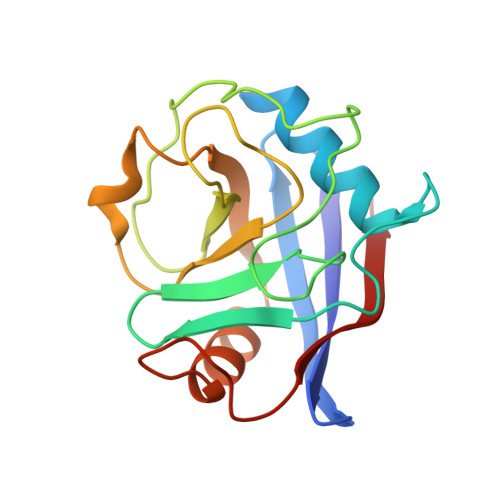Discovery and molecular basis of subtype-selective cyclophilin inhibitors.
Peterson, A.A., Rangwala, A.M., Thakur, M.K., Ward, P.S., Hung, C., Outhwaite, I.R., Chan, A.I., Usanov, D.L., Mootha, V.K., Seeliger, M.A., Liu, D.R.(2022) Nat Chem Biol 18: 1184-1195
- PubMed: 36163383
- DOI: https://doi.org/10.1038/s41589-022-01116-1
- Primary Citation of Related Structures:
7TGS, 7TGT, 7TGU, 7TGV, 7TH1, 7TH6, 7TH7, 7THC, 7THD, 7THF - PubMed Abstract:
Although cyclophilins are attractive targets for probing biology and therapeutic intervention, no subtype-selective cyclophilin inhibitors have been described. We discovered novel cyclophilin inhibitors from the in vitro selection of a DNA-templated library of 256,000 drug-like macrocycles for cyclophilin D (CypD) affinity. Iterated macrocycle engineering guided by ten X-ray co-crystal structures yielded potent and selective inhibitors (half maximal inhibitory concentration (IC 50 ) = 10 nM) that bind the active site of CypD and also make novel interactions with non-conserved residues in the S2 pocket, an adjacent exo-site. The resulting macrocycles inhibit CypD activity with 21- to >10,000-fold selectivity over other cyclophilins and inhibit mitochondrial permeability transition pore opening in isolated mitochondria. We further exploited S2 pocket interactions to develop the first cyclophilin E (CypE)-selective inhibitor, which forms a reversible covalent bond with a CypE S2 pocket lysine, and exhibits 30- to >4,000-fold selectivity over other cyclophilins. These findings reveal a strategy to generate isoform-selective small-molecule cyclophilin modulators, advancing their suitability as targets for biological investigation and therapeutic development.
- Merkin Institute of Transformative Technologies in Healthcare, Broad Institute of MIT and Harvard, Cambridge, MA, USA.
Organizational Affiliation:

















